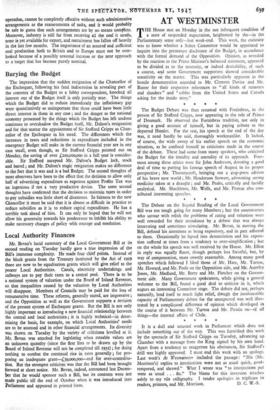Local Authority Finances
Mr. Bevan's lucid summary of the Local Government Bill at its second reading on Tuesday hardly gave a true impression of the Bill's immense complexity. He made four chief points. Instead of the block grants from the Treasury instituted by the Act of 1929 there are now to be equalisation grants which will give relief to the poorer Local Authorities. Canals, electricity undertakings and railways are to pay their rates to a central pool. There is to be a national system of valuation under the Board of Inland Revenue, so that inequalities caused by the valuation by Local Authorities will disappear. Members of Councils may be paid for the loss of remunerative time. These reforms, generally stated, are impressive ; and the Opposition as well as the Government supports a revision of the present system of Exchequer grants. But the Bill is not only highly important as introducing a new financial relationship between the central and local authorities ; it is highly technical—in deter- mining the basis, for example, on which Local Authorities' needs are to be assessed and in other financial arrangements. Its diversity was shown on Tuesday by the variety of criticisms levelled at it. Mr. Bevan was attacked for legislating when rateable values are an unknown quantity (since the first lists to be drawn up by the Board of Inland Revenue will not be completed till 1952); for doing nothing to combat the continual rise in rates generally ; for pro- posing an inadequate grant--£39,000,000--and for over-centralisa- tion. But the strongest criticism was that the Bill had been brought forward at short notice. Mr. Bevan, indeed, announced last Decem- tier that he would sponsor such a Bill, but its contents were not made public till the end of October when it was introduced into Parliament and appeared in printed form.


































 Previous page
Previous page